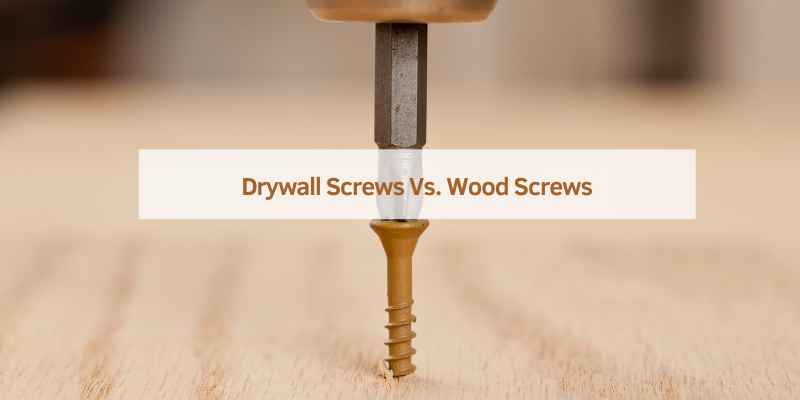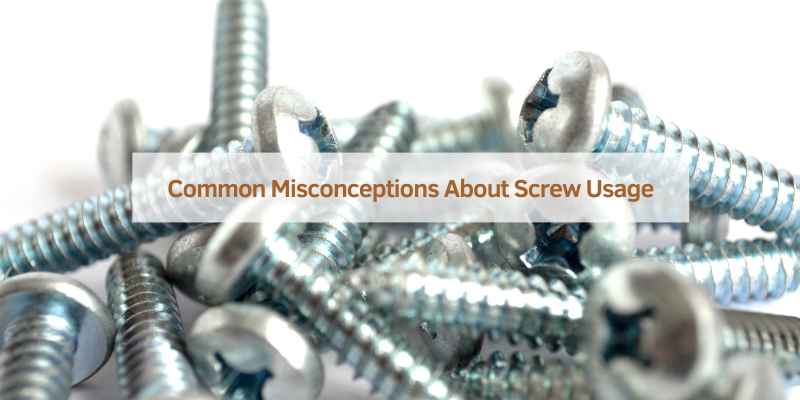No, wood screws are not suitable for use in drywall. Wood screws are designed for use in wood, while drywall screws are specifically made for attaching drywall to metal or wood.
The threads on wood screws are not designed to properly hold in drywall, so using them may result in poor quality and insecure installation. It is important to use the appropriate screws for each specific material to ensure proper installation and a secure hold.
Drywall Screws Vs. Wood Screws
When it comes to choosing the right screws for your project, it’s important to understand the key differences between drywall screws and wood screws. While both can be used for certain applications, they are designed for different materials and have specific characteristics that make them suitable for specific tasks.
Material Composition
Drywall screws and wood screws are made from different materials. Drywall screws are typically made of steel, while wood screws are a combination of materials that include steel. The composition of wood screws makes them more durable and suitable for wood applications, as they are designed to withstand the strain and pressure exerted on wood surfaces. On the other hand, drywall screws are specifically engineered to hold drywall securely in place. Therefore, it is not recommended to use wood screws for drywall due to their differing compositions.
Thread Design
The thread design of screws also plays a crucial role in determining their suitability for specific applications. Drywall screws have a coarse thread with sharp edges that help them penetrate drywall efficiently and securely. This thread design prevents the screw from slipping out of the drywall, ensuring a strong and reliable hold. Wood screws, on the other hand, have a deeper and more aggressive thread pattern, which allows them to grip wood more effectively. The different thread designs of these screws highlight their intended uses, making it essential to choose the appropriate screw for your project.
Application Specificity
One of the most significant factors to consider when deciding between drywall screws and wood screws is their application specificity. Drywall screws are specifically designed for attaching drywall to framing, while wood screws are primarily used for securing wood materials together. Using the wrong type of screw can lead to significant issues, such as lack of holding power or damage to the materials being joined. Therefore, it is crucial to use the appropriate screw for the specific task at hand to ensure optimal performance and longevity of the construction.
While it may be tempting to use wood screws for drywall, it is essential to consider the differences in material composition, thread design, and application specificity. Opting for the right screw will ensure a secure and reliable installation that will stand the test of time. So, when working with drywall projects, it is best to choose drywall screws specifically designed for this purpose.

Can Wood Screws Be Used For Drywall?
Wood screws are not suitable for drywall; they’re designed for wood, while drywall screws are specifically made for attaching drywall to metal or wood. Using wood screws for drywall may not hold properly, as their threads aren’t designed for drywall.
It’s important to use the right screws for the intended materials.
Suitability Of Wood Screws For Drywall Installation
Wood screws are designed for use in wood, with threads that are not suitable for drywall installation. While wood screws are typically made of a combination of materials including steel, they are not tailored for the specific requirements of drywall.
Potential Issues Of Using Wood Screws For Drywall
Using wood screws for drywall installation may lead to several potential issues, such as inadequate holding strength and improper fastening due to the screw threads not being optimized for drywall. Additionally, it can result in damage to the drywall and compromise the overall integrity of the installation.
Choosing The Right Screws
When it comes to securing materials like drywall, it’s essential to choose the right screws for the job. Using the wrong type of screw can result in poor holding strength, damage to the surface, and a compromised finish. To ensure a secure and long-lasting installation, it’s crucial to understand the factors to consider when selecting screws for different surfaces and the types of screws suited for specific applications.
Factors To Consider When Selecting Screws For Different Surfaces
When selecting screws for different surfaces such as drywall, wood, metal, and concrete, several factors come into play to ensure a strong and reliable hold. These factors include the type of material being fastened, the thickness of the material, the specific load or weight the screw will need to support, and the environmental conditions the screw will be exposed to.
It’s also important to consider the type of head on the screw, as well as the thread design. For example, a bugle or wafer head screw is commonly used for drywall due to its low-profile head that minimizes the risk of tearing the paper surface of the drywall.
Types Of Screws For Specific Applications
Depending on the application, different types of screws are designed to meet specific needs. For drywall installation, drywall screws are the preferred choice due to their sharp, coarse threads and self-drilling capabilities, ensuring a secure attachment to the drywall without causing damage.
When fastening wood, wood screws are the appropriate choice, featuring deep, coarse threads designed to grip and hold wood securely. These screws are available in various head styles, including flat, round, and oval heads, suitable for different wood fastening applications.
For metal applications, specialized metal screws with unique thread designs and corrosion-resistant coatings are preferred to ensure a strong and durable connection. Additionally, concrete screws with strong anchoring capabilities are specifically designed for fastening materials to concrete surfaces.
Best Practices For Drywall Installation
Using wood screws for drywall isn’t recommended as they are designed for wood, not drywall. Drywall screws are specifically made for attaching drywall to metal or wood, ensuring a secure and sturdy installation.
Utilizing Drywall Screws Correctly
When it comes to installing drywall, using the right screws can make all the difference. While wood screws may seem like a convenient alternative, it’s best to stick with drywall screws for optimal results. Drywall screws are specifically designed for drywall installation and offer several advantages over wood screws.
- Drywall screws have a tapered point and coarse threads that make them easy to start in drywall without the need for pre-drilling.
- Their sharp threads also provide excellent holding power, ensuring that the drywall stays securely in place.
- Drywall screws have a bugle head that sits flush with the surface of the drywall, minimizing the risk of bulges and uneven finishes.
- They are made of hardened steel, which makes them strong and durable, capable of withstanding the weight of the drywall.
Benefits Of Using Drywall Screws In Drywall Installation
Using drywall screws in drywall installation offers several benefits that contribute to a successful and professional-looking finish.
- Easy Installation: Drywall screws are specifically designed for drywall, making them easier to install compared to wood screws. The tapered point and coarse threads allow for effortless insertion into the drywall without the need for a pilot hole.
- Secure Hold: The sharp threads of drywall screws provide a secure hold, preventing the drywall from shifting or sagging over time. This ensures a long-lasting and stable installation.
- Flush Finish: The bugle head design of drywall screws allows them to sit flush with the surface of the drywall. This helps to create a smooth, seamless finish without any protruding screw heads.
- Reduced Damage: Drywall screws are less likely to cause damage to the drywall compared to wood screws. The fine threads of drywall screws minimize the risk of cracking or splitting the drywall during installation.
- Cost-effective: Drywall screws are widely available and cost-effective when compared to specialized wood screws. Using drywall screws can help save on expenses without compromising on quality.
In conclusion, when it comes to drywall installation, utilizing drywall screws correctly is essential for a professional and secure finish. By following the best practices and using the right screws, such as drywall screws, you can ensure a successful installation that stands the test of time.
Expert Opinions On Screw Usage
When attaching drywall, it is crucial to opt for drywall screws specifically designed for that purpose. Wood screws, meant for wood, lack the necessary thread design and may not securely hold in drywall. Selecting the appropriate screws ensures a sturdy and durable installation for your project.
Insights From Construction Professionals
Wood screws are specifically designed for wood and may not hold securely in drywall due to their thread design. Construction professionals recommend using drywall screws for drywall installations to ensure a secure and lasting hold. Drywall screws have a sharp point and fine threads that work effectively with drywall material.
Comparison Of Screw Types For Various Projects
When comparing screw types for different projects, it’s crucial to match the screw with the material being used. For wood projects, wood screws are the ideal choice due to their design and compatibility with wood fibers. On the other hand, for drywall installations, using drywall screws is recommended to prevent damage and ensure a strong attachment to the drywall.
– Wood Screws for Wood Projects: Ideal for securing wood materials due to their threading and durability.
– Drywall Screws for Drywall Installations: Specifically designed for drywall with sharp points and fine threads for a secure hold.
It’s essential to use the right type of screw according to the material to achieve optimal results and prevent potential issues such as weak attachment or damage to the surface. Matching the screw type to the project material is key to a successful construction or installation job.
Common Misconceptions About Screw Usage
Debunking Myths Related To Screw Materials
Myth: Wood screws can be used interchangeably with drywall screws.
Fact: Wood screws are specifically designed for wood, while drywall screws are tailored for drywall due to their different materials and features.
Clarification On The Versatility Of Different Screws
- Drywall screws are typically made of steel, optimized for drywall installations.
- Wood screws, on the other hand, are a blend of materials ideal for wood applications.

Frequently Asked Questions For Can I Use Wood Screws For Drywall
Are Wood Screws Ok For Drywall?
Wood screws are not suitable for drywall as they are designed for wood and have different threading.
Can You Use Wood Screws For Walls?
Wood screws are not recommended for walls because they are designed for use with wood, not drywall. Drywall screws, on the other hand, are specifically made for attaching drywall to metal or wood. Using the wrong type of screw may result in improper hold and potential damage to the wall.
What Kind Of Screws Do You Use For Drywall?
You should use drywall screws for drywall, as they are designed to securely attach drywall to metal or wood. Wood screws are intended for wood and may not hold properly in drywall due to their threads not being designed for it.
What Is The Difference Between Deck Screws And Drywall Screws?
Wood screws are for wood and drywall screws are for attaching drywall to metal or wood. Wood screws won’t hold properly in drywall because their threads aren’t designed for it.
Conclusion
To ensure the best results, it is recommended to use drywall screws for drywall installation rather than wood screws. Wood screws are specifically designed for use with wood, while drywall screws are designed to efficiently attach drywall to metal or wood frames.
While wood screws may be sturdy, their fine threads may not grip the soft drywall paper effectively. Therefore, for optimal performance and stability, it is advisable to use the appropriate screws for each specific material.


